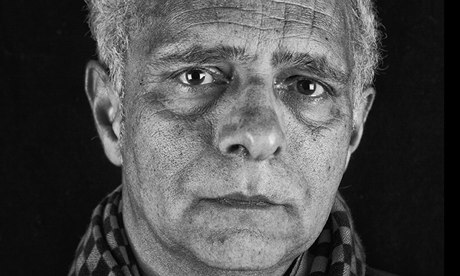Hanif Kureishi's muse has long been transgression: dazzling early success was followed by a sex-and-drugs phase, family falling-out and a lacerating novel about marital breakdown. Now, with The Last Word, has he finally pinned down who he really is?

Hanif Kureishi: 'No one ever thought, "How do we make multicultural society?'" Photograph: Antonio Olmos for the Observer
The first time I met Hanif Kureishi it was the mid-80s, and we talked about writing fiction for Faber and Faber whose list I was directing. Kureishi came into my office like a rock star and I remember thinking that he did not seem in need of a career move. He was already riding high on the international success of his screenplay, My Beautiful Laundrette.
 In fact, Kureishi was cannily pondering his next step. He was on the lookout for a means of self-expression that might sustain a way of life and over which he could have some control. Movies, he said, were chancy, a gold-rush business. There was money in novels and a mood of great expectations as a new generation of writers, especially from the Commonwealth, came through. I had just published Caryl Phillips's first novel, The Final Passage, and Kureishi expressed a quite competitive desire to outdo his Caribbean rival. Four years later, he completed The Buddha of Suburbia in which, as a sly nod to my role in its gestation, I got a walk-on part – as a policeman.
In fact, Kureishi was cannily pondering his next step. He was on the lookout for a means of self-expression that might sustain a way of life and over which he could have some control. Movies, he said, were chancy, a gold-rush business. There was money in novels and a mood of great expectations as a new generation of writers, especially from the Commonwealth, came through. I had just published Caryl Phillips's first novel, The Final Passage, and Kureishi expressed a quite competitive desire to outdo his Caribbean rival. Four years later, he completed The Buddha of Suburbia in which, as a sly nod to my role in its gestation, I got a walk-on part – as a policeman.
Today, with Kureishi's latest novel, The Last Word, due for publication, it's a good moment to review his record. To the New York Times, he's "a kind of post-colonial Philip Roth"; for the Times, he is one of "50 greatest British writers since 1945". Approaching 60, he has reached the age of honours: a CBE in 2008, plus a characteristic barb ("If it's good enough for Kylie Minogue, it's good enough for Hanif Kureishi"); the PEN/Pinter award in 2010. Like Pinter, he has just sold his manuscripts to the British Library.
Unlike some, he hasn't left for America and still lives in Shepherd's Bush, west London, where he continues to write fiction and screenplays. Le Week-End, directed by Roger Michell, starring Lindsay Duncan and Jim Broadbent, was an acclaimed cinema release in the autumn of 2013. The Last Word comes out on Tuesday. Not many contemporary writers pull off that double, especially after 30 years. But that's the thing about Kureishi: he has always performed in many dimensions (short stories, essays, screenplays), projecting a mischievous air of jeopardy and transgression.
More
 In fact, Kureishi was cannily pondering his next step. He was on the lookout for a means of self-expression that might sustain a way of life and over which he could have some control. Movies, he said, were chancy, a gold-rush business. There was money in novels and a mood of great expectations as a new generation of writers, especially from the Commonwealth, came through. I had just published Caryl Phillips's first novel, The Final Passage, and Kureishi expressed a quite competitive desire to outdo his Caribbean rival. Four years later, he completed The Buddha of Suburbia in which, as a sly nod to my role in its gestation, I got a walk-on part – as a policeman.
In fact, Kureishi was cannily pondering his next step. He was on the lookout for a means of self-expression that might sustain a way of life and over which he could have some control. Movies, he said, were chancy, a gold-rush business. There was money in novels and a mood of great expectations as a new generation of writers, especially from the Commonwealth, came through. I had just published Caryl Phillips's first novel, The Final Passage, and Kureishi expressed a quite competitive desire to outdo his Caribbean rival. Four years later, he completed The Buddha of Suburbia in which, as a sly nod to my role in its gestation, I got a walk-on part – as a policeman.Today, with Kureishi's latest novel, The Last Word, due for publication, it's a good moment to review his record. To the New York Times, he's "a kind of post-colonial Philip Roth"; for the Times, he is one of "50 greatest British writers since 1945". Approaching 60, he has reached the age of honours: a CBE in 2008, plus a characteristic barb ("If it's good enough for Kylie Minogue, it's good enough for Hanif Kureishi"); the PEN/Pinter award in 2010. Like Pinter, he has just sold his manuscripts to the British Library.
Unlike some, he hasn't left for America and still lives in Shepherd's Bush, west London, where he continues to write fiction and screenplays. Le Week-End, directed by Roger Michell, starring Lindsay Duncan and Jim Broadbent, was an acclaimed cinema release in the autumn of 2013. The Last Word comes out on Tuesday. Not many contemporary writers pull off that double, especially after 30 years. But that's the thing about Kureishi: he has always performed in many dimensions (short stories, essays, screenplays), projecting a mischievous air of jeopardy and transgression.
More

No comments:
Post a Comment